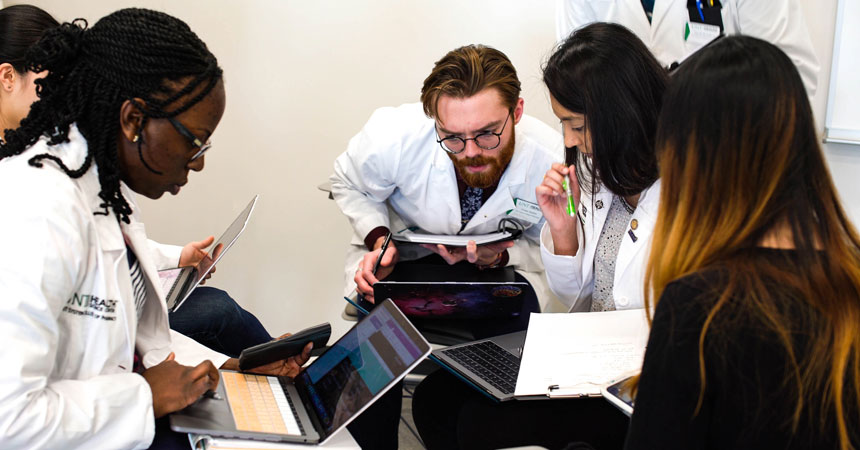Escape rooms offer pharmacy students innovative learning experience
By Alex Branch
Escape rooms, the popular adventure game where people solve puzzles to escape a locked area, are good for testing mental strength under pressure.
Turns out, they’re also good for learning how to be a pharmacist.
UNT Health Science Center 2nd-year pharmacy students completed an innovative learning experience in the form of “escape rooms” created by two UNT System College of Pharmacy faculty members.
Cheng Yuet, PharmD, and Brittany N. Palasik, PharmD, crafted the exercise as a unique way to practice collaboration in situations their students will face as future health care providers.
In this case, the two “escape rooms” were a hospital room and an outpatient clinical room. To escape, students worked in teams to solve puzzles related to the management of a patient with diabetes.
To solve the puzzles, students used the tools found in the rooms — a patient bed, an intravenous drip pole, a vial of potassium and more.
Just as in a busy hospital, time was limited. Students only had 20 minutes to escape each room.
“It brought us a lot closer to understanding the real-life experiences we’ll face as pharmacists,” said Frank Ssentamu, a 2nd-year pharmacy student. “The most important thing I learned was how to work together quickly as one team with the common goal of caring for the patient.
“If you don’t listen attentively and communicate clearly, you can’t take care of the patient effectively.”
The escape rooms were an example of the mindset of innovation that UNTHSC brings to learning. The activities were held in the Patient Safety Room in the Interdisciplinary Research and Education Building, a five-story, 173,000-square-foot facility that opened in 2018.
The puzzles required students to manage a patient through a transition of care, from the emergency room to a hospital bed, or from an outpatient clinic to their home.
“The introduction of transitions-of-care in a didactic setting has not been well-studied in pharmacy literature, so we hope to address a gap at our institution,” Dr. Yuet said.
Students found their puzzles to solve in a lockbox. To complete them, students had to calculate medication and fluid amounts, identify criteria needed to transfer a patient and provide clear and correct prescriptions for patients to follow.
“They experience real-life problems — patients not taking their medications properly, breakdowns in communication between hospital floors and between providers,” Dr. Palasik said. “This felt like a creative way to prepare them to solve those problems.”






Social media